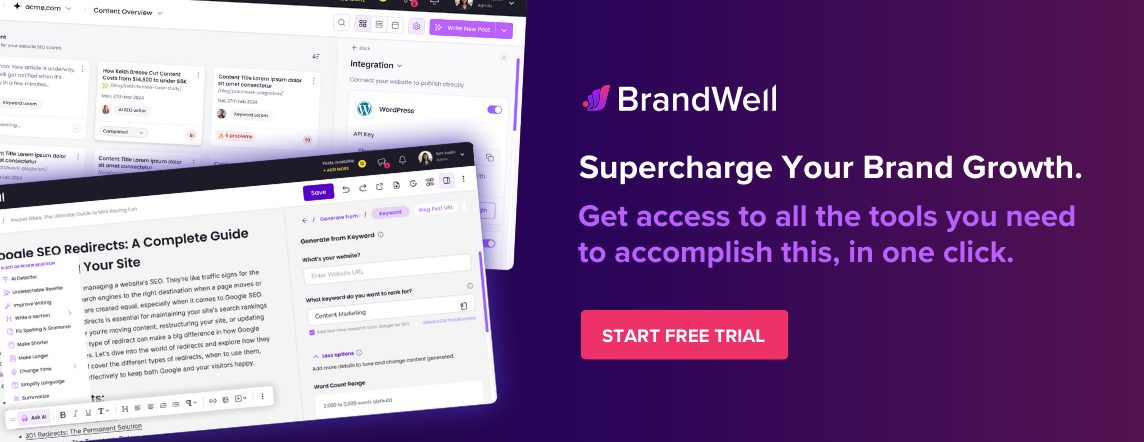Discover top guides, trends, tips and expertise from AIO Writers
Can Google Detect AI Content? What You Need to Know
Jeff Joyce
Thursday, 16th Feb 2023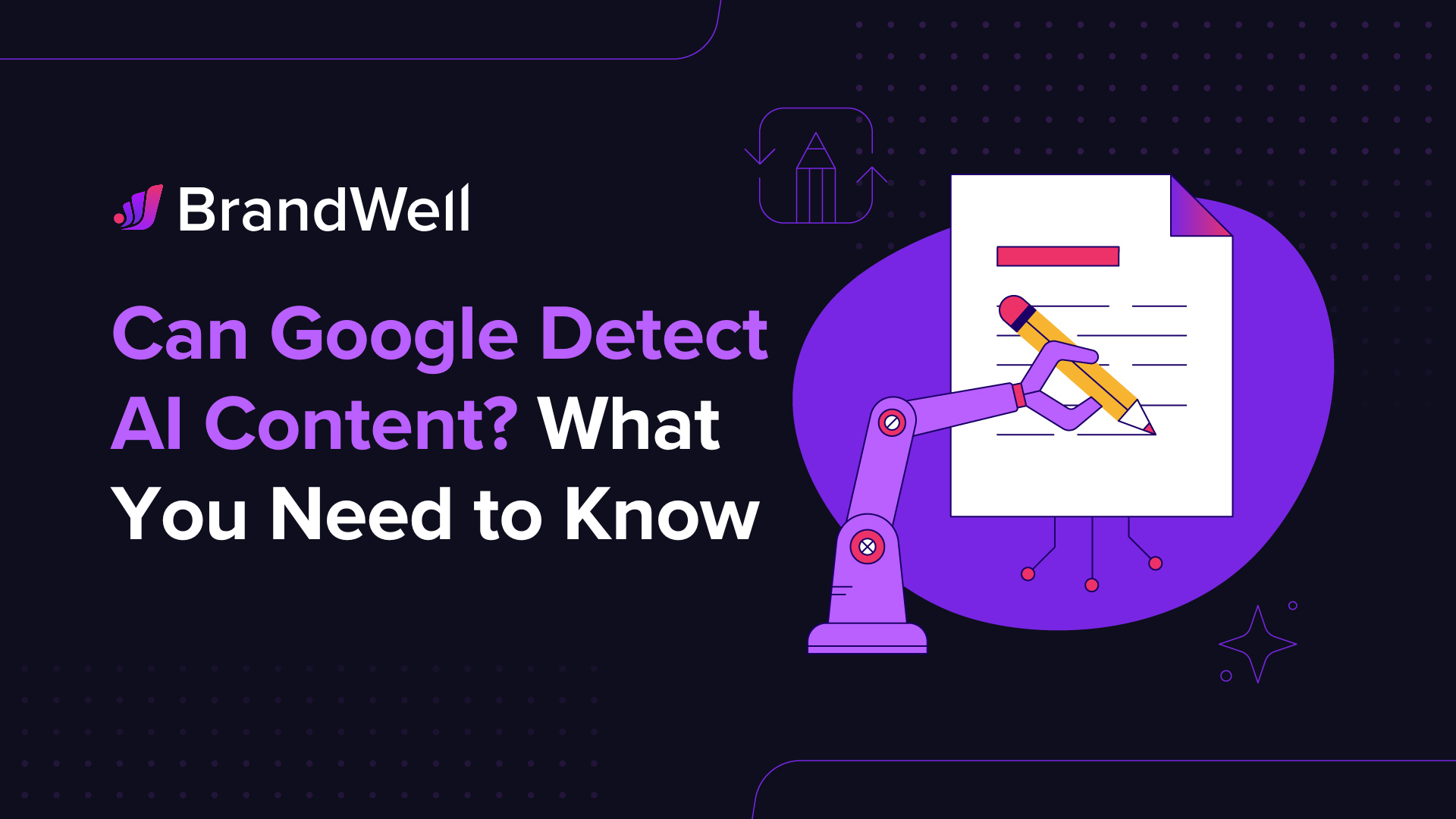
As AI tools like ChatGPT and BrandWell become more popular, one big question keeps popping up: Can Google tell if the content is written by AI? And if it can, does it even matter?
For content creators, marketers, and anyone hoping to rank well in search results, understanding Google’s approach to AI content has become more important than ever.
In this article, we’ll dive into what we know about Google’s ability to detect AI content, how it affects rankings, and whether there’s really a difference between machine-written and human-written content in the eyes of the algorithm.
Plus, we’ll look at the role of EEAT — Google’s principles of experience, expertise, authority, and trustworthiness — and how it applies to AI-generated content.
By the end, you’ll know what to consider when using AI tools for content and how to ensure your content aligns with Google’s standards.
Let’s break down what Google really thinks about AI writing!
What is E-E-A-T? Google’s Guide to Quality Content
Before diving into whether Google can detect AI-generated content, it’s essential to understand E-E-A-T — a set of principles that guide Google’s view on quality content.
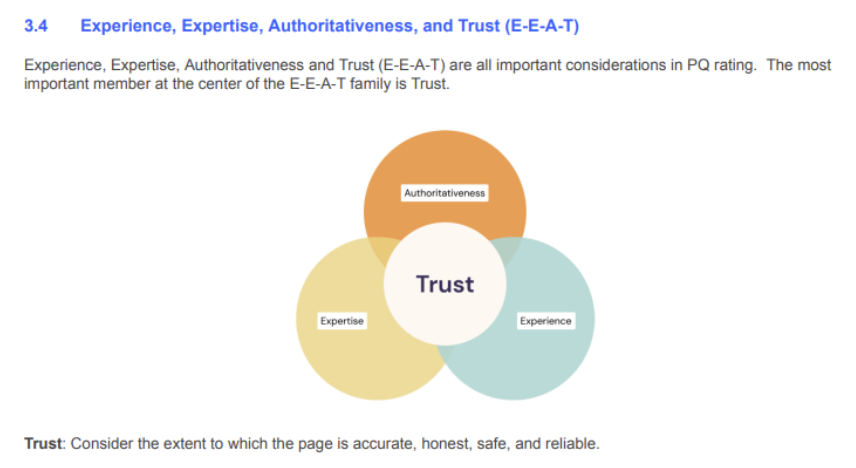
EEAT stands for Experience, Expertise, Authority, and Trustworthiness. These criteria are central to how Google evaluates content and determines if it’s useful, credible, and worthy of ranking high in search results.
1. Experience: Google wants content that reflects genuine firsthand experience. This could mean an author who has used a product, a reviewer who has visited a location, or an expert sharing insights based on their practice. Experience helps Google ensure that readers are getting authentic, insightful information rather than regurgitated facts.
2. Expertise: This element is all about the author’s or creator’s level of skill or knowledge in a particular area. Expertise is crucial in fields like finance, health, and law, where inaccurate information can have serious consequences. Google wants to see that the content is crafted by someone who knows their field well.
3. Authority: Authority goes a step further by looking at the creator’s reputation and standing within their industry. This factor is often boosted by mentions, backlinks, or references from other reputable sites. Authority demonstrates that a creator or site is well-regarded in their field.
4. Trustworthiness: Trust is the foundation of EEAT. Google evaluates whether a site, author, or piece of content can be trusted, looking for factors like transparency, clear sourcing, and a reliable domain. Trustworthiness is essential in helping users feel confident that the content they’re reading is accurate and credible.
To comply with E-E-A-T principles:
- Authors must have expertise in their subject matter.
- Authors and websites must provide evidence that supports their claims.
- The information must be up-to-date and accurate.
- Sources must be verified when possible.
- Sites must be transparent about who owns them and provide contact information if necessary.
Google introduced EEAT as part of its Search Quality Evaluator Guidelines in 2018, though its roots trace back to Google’s broader focus on rewarding high-quality, reliable content. Initially, EEAT was a guiding framework for Google’s human evaluators, who assess how well the algorithm is working. However, over time, these principles have influenced Google’s algorithmic changes, shaping how content is ranked.
The “why” behind EEAT is simple: Google’s mission is to provide users with the most accurate, relevant, and high-quality content. As misinformation and low-quality content flooded the internet, Google needed a way to reward trustworthy information while filtering out content that could mislead or harm users. With EEAT, Google emphasizes quality and reliability, benefiting content that genuinely serves the audience.
This context around EEAT sets the stage for why AI-generated content faces scrutiny. Whether human or machine, content must meet these standards to perform well in Google’s eyes.
What Does Google Think of AI Content?
The explosion of ChatGPT in late 2022 sparked a huge surge in discussions about AI-powered writing tools.
Overnight, the content marketing world found itself a powerful tool that could potentially replace human content writers.
Understandably, questions started pouring in.
How could marketers pass up such a powerful tool that promised to save significant time and money? But if they did embrace it, would Google impose penalties?
Danny Sullivan, Google Search Liaison, responded to these questions on Twitter.
Would help to get some kind of on-the-record statement from Google about this, relative to their previous guidance on AI-generated content.
Is this considered non-violative based on it being “backstopped” by a human? Other reasons? Genuinely curious.
cc: @JohnMu @searchliaison https://t.co/Ft4XRMVQcf
— Blair MacGregor (@blairmacgregor) January 11, 2023
Danny Sullivan responded with a definite “yes.”
BUT, he clarified that ANY content written to help people has the potential to rank. Even AI content, when created and guided with that intention, is fair game.
At the same time, ANY content written just to earn search rankings is an issue – even if it was written by humans.
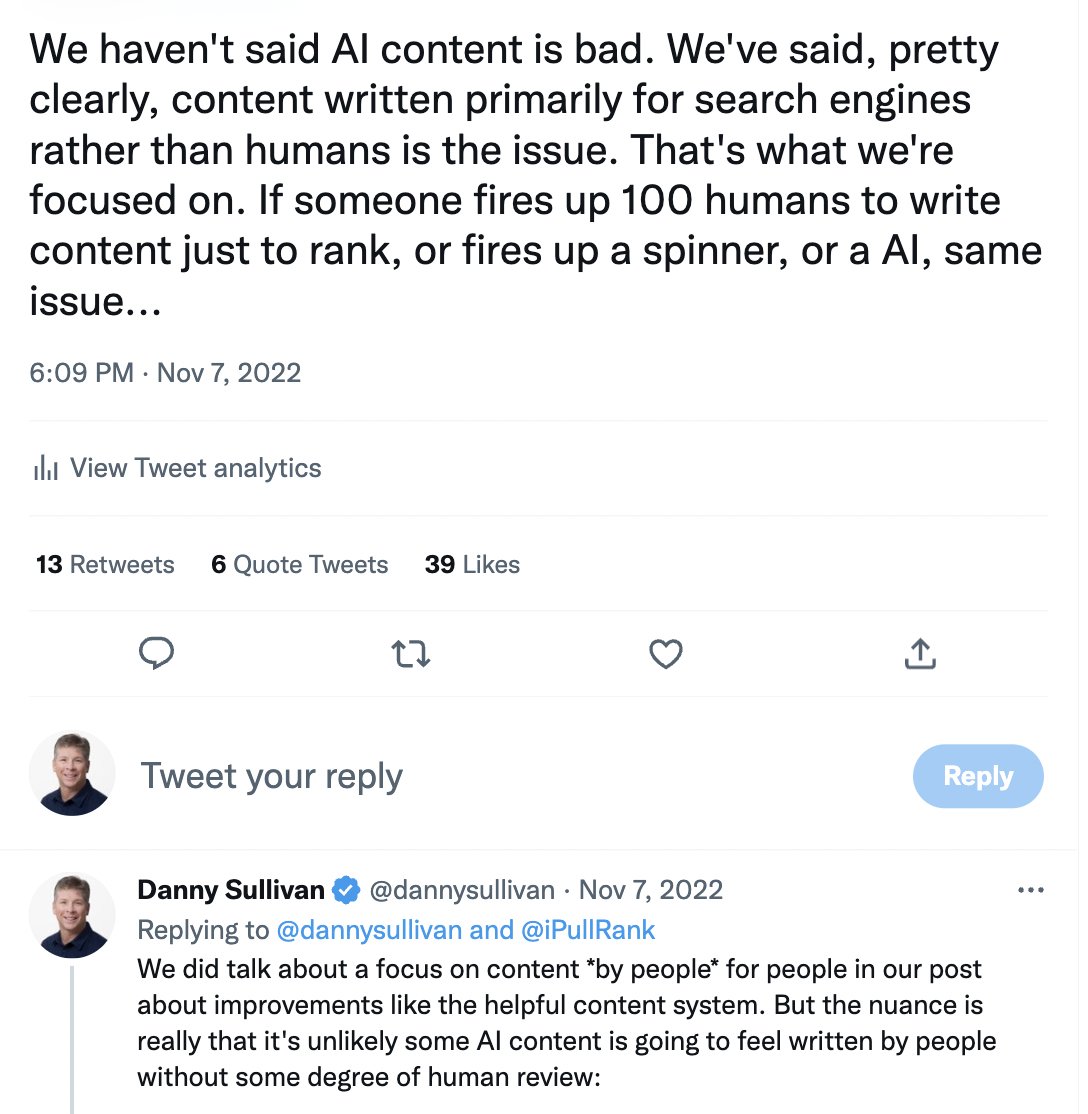
To sum up, as long as you’re creating helpful, people-first content that meets EEAT guidelines, using AI content generators shouldn’t be an issue.
But:
- Always, ALWAYS ensure your AI content tools are guided with an expert human touch.
- Fact-check AI content thoroughly.
- NEVER publish unedited, untouched AI content.
- Always create content FOR THE PEOPLE, whether a human writer or an AI wrote the first draft.
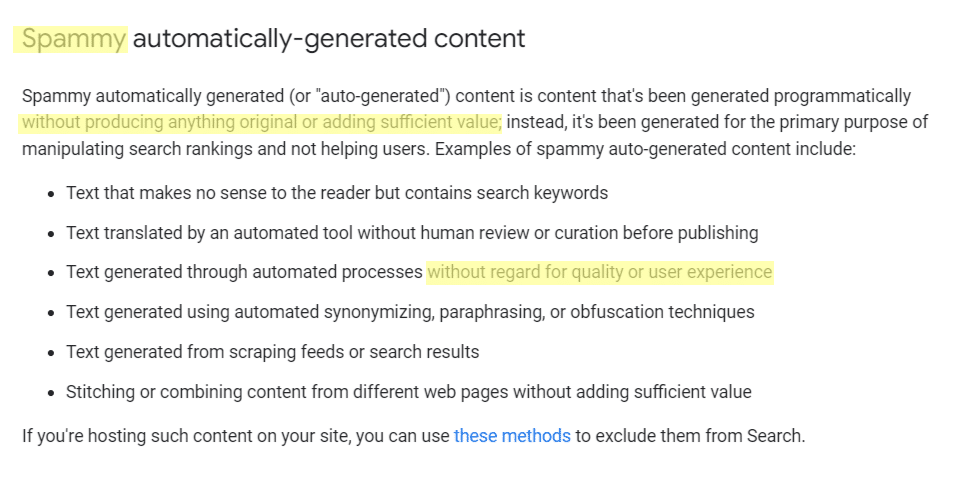
Source: Spam policies for Google web search
So Can Google Detect AI Content?
The short answer is yes — Google is developing methods to identify AI-generated content.
Google uses a combination of advanced algorithms, machine learning, and its vast database of user signals to identify AI-generated content. While it’s unlikely that Google will reveal the full scope of its detection methods, a few likely techniques include:
- Pattern Recognition and Language Models: AI-generated text often contains unique patterns, phrases, or repetitions that set it apart from human writing. Google has its own AI models—like BERT and MUM—that understand language at a deep level and are trained to recognize the subtle differences between human-generated and machine-generated content. These models analyze grammar, structure, and phrasing, which can be different when produced by AI.
- Quality and Relevance Signals: Google’s algorithms are designed to prioritize high-quality, relevant content. If AI-generated content doesn’t meet EEAT standards, Google’s algorithms may devalue it, even if it’s not explicitly flagged as AI-written. Low-quality or overly generic text—often a pitfall of AI—may trigger quality filters, reducing its ranking potential.
- User Engagement Metrics: Google also looks at how users interact with content. If AI content doesn’t engage users or has high bounce rates, low time-on-page, or poor click-through rates, Google can interpret this as a signal that the content isn’t meeting user needs, regardless of how it was generated. These engagement metrics play a role in determining whether AI content serves its purpose for readers.
- Cross-Referencing External Data and Known AI Training Sources: Google can compare content against its massive index of existing web content and known AI-generated text. If it finds excessive overlap or detectably “generic” content, it may assume the content lacks originality or EEAT signals.
Here’s an example of unedited content created with ChatGPT. To a trained eye, it’s obvious a bot wrote this:

What Are the Risks of Publishing Unedited AI Content?
Publishing AI-generated content without human review can seem like a quick win, but it comes with significant risks. Here’s why unedited AI content can pose a threat to both your rankings and your brand’s reputation:
1. Inaccuracy and Misinformation
AI content generators are powerful, but they’re not flawless. They often make factual errors, misunderstand nuanced topics, or include outdated information.
Unedited AI content risks publishing incorrect or misleading information, which can damage your credibility and even harm users if they rely on your content in areas like health, finance, or legal advice.
2. Lack of Originality
AI-generated content often lacks originality and depth. It can produce text that feels repetitive, overly generalized, or even “canned,” which fails to engage readers. Google’s algorithms can detect these patterns, and unoriginal content can negatively impact your rankings.
Audiences can also detect generic or “cookie-cutter” content, which can hurt your brand’s image and make it difficult to build reader loyalty.
3. EEAT Limitations
As we covered earlier, AI content struggles to meet Google’s EEAT standards on its own. Without a human touch, AI content lacks genuine experience and nuanced expertise, which can result in lower authority and trustworthiness.
For example, AI cannot write an authentic restaurant review because it did not actually go there to eat. AI might miss important insights or fail to present a unique perspective that human writers can bring, making it harder for Google to assess the content as high quality.
4. Potential for Google Penalties
While Google hasn’t explicitly stated that it will penalize AI content solely because of its origin, it does penalize low-quality or misleading content.
Publishing unedited AI text increases the risk of falling below Google’s quality standards, which could lead to lower rankings or, in severe cases, even penalties. The last thing any site wants is to see its hard-earned rankings drop because of a lack of quality control.
5. Negative User Experience
Ultimately, AI content is only as good as the prompts and instructions it receives. Without careful editing, AI text can feel robotic, lacking the voice, personality, and engagement that readers expect. This can lead to high bounce rates, short time-on-page, and poor engagement metrics—all signs to Google that users aren’t finding your content helpful or relevant.
6. Brand Reputation Risks
Finally, your content reflects your brand. Publishing low-quality, unedited AI content can create a perception that your brand is impersonal, lazy, or uninterested in providing genuine value to readers. Over time, this can erode trust with your audience and harm your brand’s reputation.
To avoid these risks, it’s essential to have a human review process for AI-generated content. Adding firsthand insights, ensuring accuracy, and maintaining a unique brand voice can transform AI-generated drafts into valuable, high-quality content that aligns with both Google’s standards and your audience’s needs.
How to Detect AI Content
Whether you’re concerned about the quality of content on your site or want to avoid potential Google issues, detecting AI-generated content can be a valuable skill. Here are two tools to identify AI content:
1. OpenAI’s AI Classifier
OpenAI, the company behind ChatGPT, has trained a classifier to distinguish between human and AI-written content.
Note: This tool is not reliable 100% of the time, and OpenAI says it’s still a “work in progress.”
Here’s an example of this tool in action. I tested the introduction for this post you’re reading (which, by the way, was human-written):
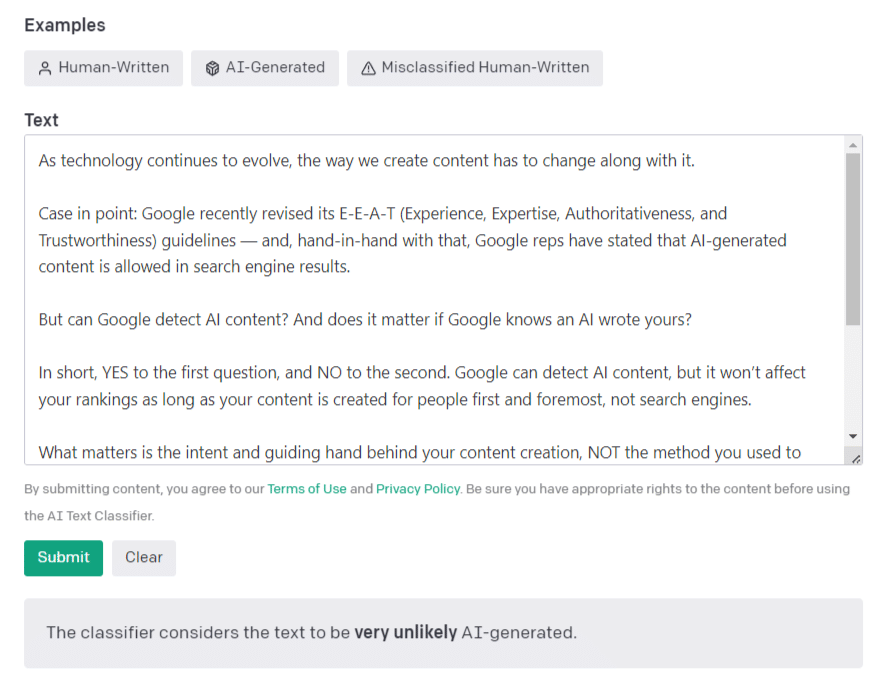
2. BrandWell’s AI Detector
BrandWell also has an AI Detector tool that analyzes text and highlights areas that may read as AI-written or AI-watermarked.
Just paste the content you want to check into the text box and hit “Detect AI Content.”
As you can see, I checked a blog intro that ChatGPT wrote and the BrandWell AI Detector flagged the text as likely AI-generated.
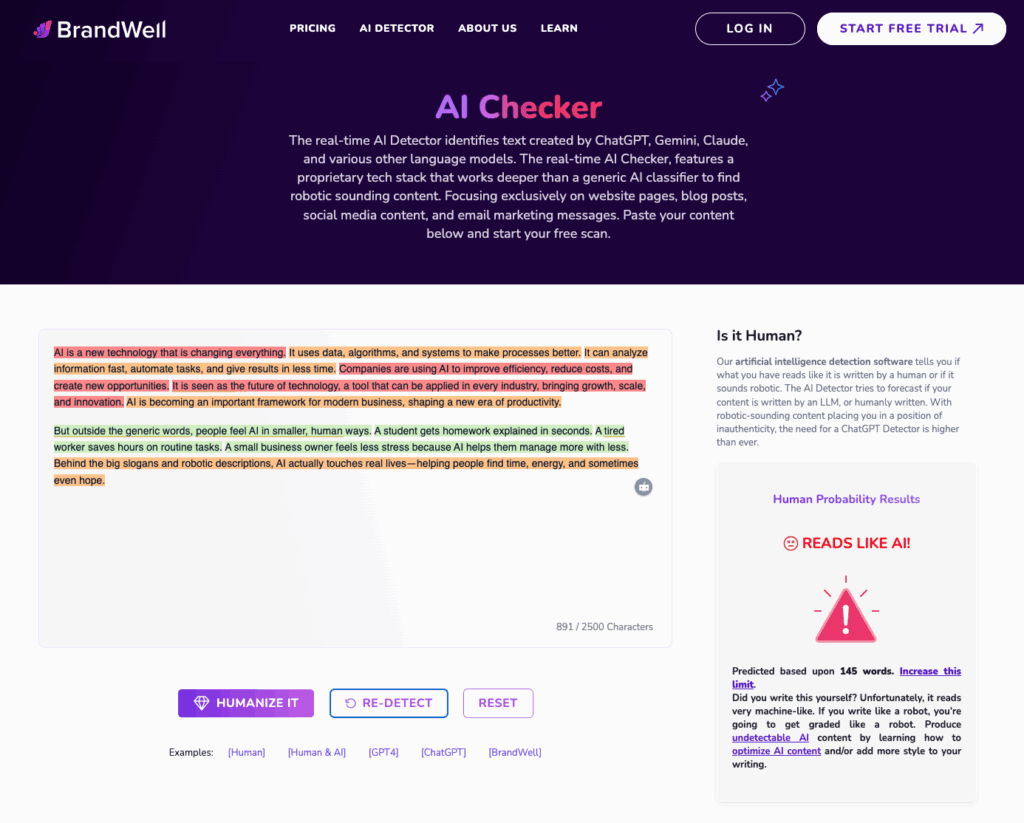
Google Can Detect AI Content, But Helpful Content Creators Shouldn’t Be Worried
Google’s revised EEAT guidelines have indeed made room for AI content creation, and Google’s Danny Sullivan has confirmed that they’re open to allowing this type of content on their platform.
How AI-generated content will ultimately impact SEO and digital marketing is still evolving, but one thing is clear: AI content is now a legitimate tool for businesses aiming to grow their online presence.
The key takeaway? Focus on creating quality, value-driven content that resonates with your audience. As long as your content meets high standards, aligns with EEAT principles, and serves the needs of your readers, there’s no need to worry about whether it’s AI-generated or human-written.
Embrace the potential of AI, and use it thoughtfully to enhance your content strategy!

UNLOCK YOUR POTENTIAL
Long Headline that highlights Value Proposition of Lead Magnet
Grab a front row seat to our video masterclasses, interviews, case studies, tutorials, and guides.

